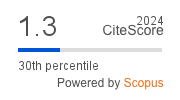Aktivitas antibakteri flavonoid propolis Trigona sp terhadap bakteri Streptococcus mutans (in vitro) (In vitro antibacterial activity of flavonoids Trigona sp propolis against Streptococcus mutans)
Vol. 38 No. 3 (2005): September 2005
Articles
September 1, 2005
Downloads
Sabir, A. (2005). Aktivitas antibakteri flavonoid propolis Trigona sp terhadap bakteri Streptococcus mutans (in vitro) (In vitro antibacterial activity of flavonoids Trigona sp propolis against Streptococcus mutans). Dental Journal (Majalah Kedokteran Gigi), 38(3), 135–141. https://doi.org/10.20473/j.djmkg.v38.i3.p135-141
Downloads
Download data is not yet available.
- Every manuscript submitted to must observe the policy and terms set by the Dental Journal (Majalah Kedokteran Gigi).
- Publication rights to manuscript content published by the Dental Journal (Majalah Kedokteran Gigi) is owned by the journal with the consent and approval of the author(s) concerned.
- Full texts of electronically published manuscripts can be accessed free of charge and used according to the license shown below.
- The Dental Journal (Majalah Kedokteran Gigi) is licensed under a Creative Commons Attribution-ShareAlike 4.0 International License

















